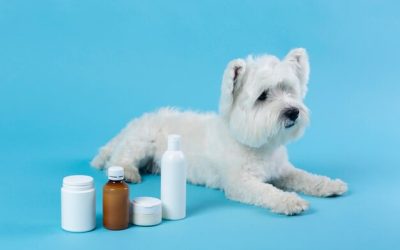Imodium for Dogs: Risk, Side Effects & Alternatives

Caring for your dog means making thoughtful decisions about their health, especially when they face digestive discomfort. While Imodium (loperamide) is a common over-the-counter medication for humans, its use in dogs requires caution and careful consideration. Ensuring your pet’s well-being starts with understanding the potential benefits and risks of any treatment option.
Understanding the Role of Imodium for Dogs
Imodium works by slowing intestinal movement, which can help reduce the frequency of bowel movements and allow for better fluid absorption. However, its use in dogs isn’t straightforward, as factors like age, size, and overall health play a critical role in determining its safety.
Since Imodium isn’t FDA-approved for canine use, it is important to never give it to your pet without consulting with a veterinarian first. H2 –
When Do Veterinarians Recommend Imodium?
In certain cases, veterinarians may suggest Imodium to manage temporary diarrhea in dogs. This is typically appropriate when the cause of diarrhea is identified and the condition is mild or non-threatening. By slowing intestinal transit, Imodium may help reduce dehydration risks.
However, Imodium only addresses symptoms—it doesn’t treat the underlying cause. Whether the diarrhea stems from dietary changes, infections, or chronic conditions, proper diagnosis and treatment are crucial for your dog’s recovery.
Recognizing Risks and Side Effects
While Imodium can provide relief, potential side effects include:
- Constipation: Excessive or prolonged use may lead to constipation.
- Dehydration: Imodium might delay treatment for the root cause by masking symptoms, increasing dehydration risks.
- Neurological Effects: In rare cases, Imodium may cross the blood-brain barrier, causing disorientation, lethargy, or seizures.
- Medication Interactions: Imodium can affect how other medications work, so veterinary guidance is critical.
Are There Safer Alternatives Than Imodium for Dogs With Diarrhea?
As written in the American Kennel Club article: ‘“Most cases of diarrhea respond to conservative therapy and don’t need Imodium,” Dr. Mandell says. “It is much safer to start by switching to a bland diet and adding probiotics,” she says.
Probiotics for dogs help safely restore a healthy intestinal microbial balance, and a bland diet, such as a mix of plain boiled chicken and white rice, is gentle on the gastrointestinal tract. Feed small meals frequently throughout the day rather than one or two large ones.
“If this is not resolving the diarrhea, then it may be that the diarrhea is actually a sign of something more serious going on,” Dr. Mandell says. Contact your veterinarian for advice if things don’t settle after 48 hours. This is also important if other symptoms, such as vomiting, stomach pain, appetite loss, fever, or lethargy, accompany the diarrhea.’
When to Seek Veterinary Care
While mild diarrhea often resolves on its own, certain situations require immediate attention:
- Severe or bloody diarrhea.
- Diarrhea lasting over 24-48 hours.
- Accompanying symptoms like vomiting, lethargy, or fever.
- Diarrhea in puppies, seniors, or dogs with pre-existing conditions.
Tips for Preventing Digestive Issues in Dogs
Prevention is the best approach to maintaining your dog’s digestive health:
- Feed a balanced, high-quality diet.
- Transition to new foods gradually.
- Limit access to table scraps and high-fat treats.
- Maintain proper hygiene with clean food and water bowls.
- Schedule regular veterinary check-ups to address potential health concerns early.
How Can Pet Insurance Help You if Your Dog Needs a Treatment?
Pet insurance can be a valuable tool in managing the costs of treating a dog’s veterinary expenses. By having a pet insurance policy in place, you can have peace of mind knowing that you can provide medical care for your furry companion without worrying about the financial burden. Pet insurance can help cover the costs of veterinary consultations, diagnostic tests, medications, and even specialized treatments if required.
Reimbursement
This method is the most common for pet insurance companies. You pay out of pocket for the veterinarian bill, and then the insurance company reimburses you for what’s covered under the insurance plan. The steps look like this.
- You pay the vet bill after your dog’s visit.
- You fill out the pet insurance claim form.
- Submit the claim form and other required documentation to the insurer.
- After the claim is approved, you will be reimbursed for eligible expenses.
What Does Odie Pet Insurance Cover?
Pet insurance covers various veterinary expenses, providing financial protection and peace of mind for pet owners. Here are the details of the coverage options offered by Odie Pet Insurance:
Illness & Injury Plan
The Illness & Injury Plan is an all-inclusive insurance plan designed to cover a wide range of medical needs for your pet. This plan includes comprehensive coverage for various illnesses, injuries, and veterinary services. Some of the covered items include:
- Veterinary exams and consultations
- Diagnostics (e.g., X-rays, lab tests)
- Prescribed medications
- Surgeries and hospitalization
- Rehabilitation, acupuncture, or chiropractic treatments
- Medically necessary supplies
- Euthanasia and cremation
The Wellness Plan
The Wellness Plan is a monthly membership that focuses on preventive care and covers routine veterinary services.
- Provides reimbursements for routine care items such as wellness visits (exams and vaccines), testing and parasite prevention, dental cleanings and at-home dental care, vitamins, supplements, and more.
- Through Odie’s partnership with Petivity, a leader in smart pet products and proactive care, Wellness Plan members can also receive reimbursements for Petivity devices and health kits, as well as eligible Purina food and supplements.
- Total reimbursement up to $700 per year.




